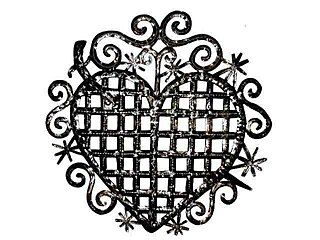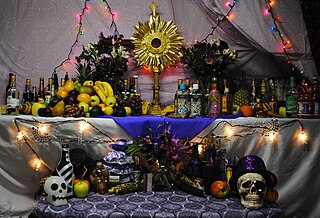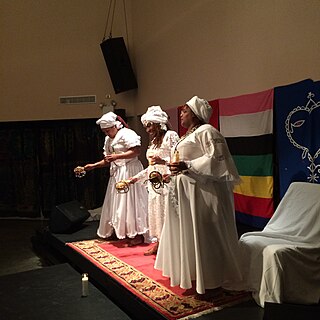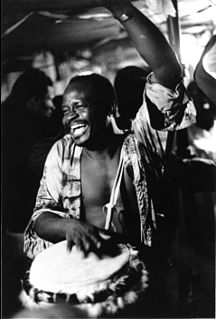
The loa are the spirits of Haitian Vodou and Louisiana Voodoo. They are intermediaries between Bondye – the Supreme Creator, who is distant from the world – and humanity. Unlike saints or angels, however, they are not simply prayed to, they are served. They are each distinct beings with their own personal likes and dislikes, distinct sacred rhythms, songs, dances, ritual symbols, and special modes of service. Contrary to popular belief, the loa are not deities in and of themselves; they are intermediaries for, and dependent on, a distant Bondye or god.

Damballa, also spelled Damballah, Dambala, Dambalah, among other variations, is one of the most important of all loa, spirits in Haitian Vodou and Louisiana Voodoo traditions. He is portrayed as a great white serpent, originating in the city of Wedo in modern-day Benin. Damballa is said to be the Sky Father and the primordial creator of all life, or the first thing created by Gran Met. In those Vodou societies that view Damballa as the primordial creator, he created the cosmos by using his 7,000 coils to form the stars and the planets in the heavens and to shape the hills and valleys on earth. In others, being the first thing created by God, creation was undertaken through him. By shedding the serpent skin, Damballa created all the waters on the earth. As a serpent, he moves between land and water, generating life, and through the earth, uniting the land with the waters below. Damballa is usually syncretized with either Saint Patrick or Moses. He is counted among the Rada loa.

Papa Legba is a lwa in Haitian Vodou, who serves as the intermediary between the loa and humanity. He stands at a spiritual crossroads and gives permission to speak with the spirits of Guinee, and is believed to speak all human languages. In Haiti, he is the great elocutioner. Legba facilitates communication, speech, and understanding. He is commonly associated with dogs. Papa Legba is invoked at the beginning of every ceremony.

Erzulie is a family of loa, or spirits, in Vodou.
Kalfu is one of the petro aspects of Papa Legba, a loa in Haitian Vodou. He is often envisioned as a young man or as a demon; his color is red and he favors rum infused with gunpowder. He is often syncretized with Satan.

Ezilí Dantor or Erzulie Dantó is the main loa or senior spirit of the Petro family in Haitian Vodou.
Haitian Vodou is a syncretic mixture of Roman Catholic rituals developed during the French colonial period, based on traditional African beliefs, with roots in Dahomey, Kongo and Yoruba traditions, and folkloric influence from the indigenous Taino peoples of Haiti. The Loa, or spirits with whom Vodouisants work and practice, are not gods but servants of the Supreme Creator Bondye. In keeping with the French-Catholic influence of the faith, vodousaints are for the most part monotheists, believing that the Loa are great and powerful forces in the world with whom humans interact and vice versa, resulting in a symbiotic relationship intended to bring both humans and the Loa back to Bondye. "Vodou is a religious practice, a faith that points toward an intimate knowledge of God, and offers its practitioners a means to come into communion with the Divine, through an ever evolving paradigm of dance, song and prayers."

Houngan or oungan is the term for a male priest in Haitian Vodou. The term is derived from the Fon word hounnongan. Houngans are also known as makandals.

Homosexuality in Haitian Vodou is religiously acceptable and homosexuals are allowed to participate in all religious activities. However, in countries with large Vodou populations, some Christian influence may have given homosexuality a social stigma, at least on some levels of society.

A mambo is a priestess in the Haitian Vodou religion. Haitian Vodou's conceptions of priesthood stem from the religious traditions of enslaved people from Dahomey, in what is today Benin. For instance, the term mambo derives from the Fon word nanbo. Like their West African counterparts, Haitian mambos are female leaders in Vodou temples who perform healing work and guide others during complex rituals. This form of female leadership is prevalent in urban centers such as Port-au-Prince. Typically, there is no hierarchy among mambos and houngans. These priestesses and priests serve as the heads of autonomous religious groups and exert their authority over the devotees or spiritual servants in their hounfo (temples). Mambos and houngans are called into power via spirit possession or the revelations in a dream. They become qualified after completing several initiation rituals and technical training exercises where they learn the Vodou spirits by their names, attributes, and symbols. The first step in initiation is lave tèt, which is aimed at the spirits housed in an individual's head. The second step is known as kouche, which is when the initiate enters a period of seclusion. Typically, the final step is the possession of the ason, which enables the mambos or houngan to begin their work. One of the main goals of Vodou initiation ceremonies is to strengthen the mambo's konesans (knowledge), which determines priestly power.
The Rada are a family of lwa spirits in the religion of Haitian Vodou. They are regarded as being sweet-tempered and "cool", in this contrasting with the Petro lwa, which are regarded as volatile and "hot".

Haitian Vodou is an African diasporic religion that gradually developed in Haiti between the 16th and 19th centuries. It arose through a process of syncretism between the traditional religions of West Africa and the Roman Catholic form of Christianity. Adherents are known as Vodouists or "servants of the spirits". There is no central authority in control of Vodou, which is organised through autonomous groups.

Sallie Ann Glassman is an American practitioner of Haitian Vodou, a writer, and an artist. She was born in Kennebunkport, Maine and is of Jewish—Ukrainian heritage.
Vodou drumming and associated ceremonies are folk ritual faith system of henotheistic religion of Haitian Vodou originated and inextricable part of Haitian culture.
Mama Lola is the nickname of a prominent Vodou spiritual and arts and culture leader in the United States. In 1991, the late Karen McCarthy Brown published the first edition of Mama Lola: A Vodou Priestess in Brooklyn, an ethnography based on the life of her research collaborator and friend since 1978, Alourdes. For the purposes of protecting the privacy of Alourdes and her family, Brown modified certain details of her life like her birthdate and name and the names of her descendants. The initial pseudonym attributed to Alourdes was "Marie Thérèse Alourdes Macena Margaux Kowalski". Already a prominent leader in her Brooklyn community and with strong ties maintained with her mother's neighborhood in Port-au-Prince, Alourdes rose to greater public prominence as she increasingly participated in the arts and culture fields, academia, and other spiritual communities in the United States in the wake of the publication of the book. She increasingly used the nickname in her public appearances and also disclosed her full name at these venues. In the second edition of the book in 2001, Brown published Alourdes's full legal name, "Marie Thérèse Alourdes Macena Champagne Lovinski". According to Brown, " ... Alourdes combines the skills of a medical doctor, a psychotherapist, a social worker, and a priest." (5) Among the many spiritual communities that she now advises, Brown's research collaborator and friend Alourdes serves on occasion as a manbo (mambo) in a cultural center in New Orleans, Louisiana. The information that follows within this Wikipedia entry is derived mainly from the book in its first, second, and third editions. This Wikipedia entry reuses the pseudonyms Brown conferred on the people in Alourdes's life and some of the ways Brown combined accounts and created composite characters, or, as one notable scholar and artist writes about the book, how Brown took "creative liberties fictionalizing various strands of Lola’s familial and spiritual genealogies." This Wikipedia entry also uses current Haitian Creole (Kreyòl) spelling in the description of the spiritual entities of Vodou, which have other spellings in French and other iterations of French Creole languages.

Akan religion comprises the traditional beliefs and religious practices of the Akan people of Ghana and eastern Ivory Coast. Akan religion is referred to as Akom. Although most Akan people have identified as Christians since the early 20th century, Akan religion remains practiced by some and is often syncretized with Christianity. The Akan have many subgroups, so the religion varies greatly by region and subgroup. Similar to other traditional religions of West and Central Africa such as West African Vodun, Yoruba religion, or Odinani, Akan cosmology consists of a senior god who generally does not interact with humans and many gods who assist humans.
Karen McCarthy Brown was an anthropologist specializing in the anthropology of religion. She is best known for her groundbreaking book Mama Lola: A Vodou Priestess in Brooklyn, which made great strides in destigmatizing Haitian Vodou. Until her retirement in 2009 due to illness, McCarthy Brown was a Professor of Anthropology at Drew University. At Drew University, McCarthy Brown was the first woman in the Theological School to receive tenure and to achieve the rank of full professor.

Frisner Augustin was a major performer and composer of Haitian Vodou drumming, and the first and only citizen of Haiti to win a National Heritage Fellowship from the National Endowment for the Arts in the United States, where he resided for forty years.

Haitian Vodou art is art related to the Haitian Vodou religion. This religion has its roots in West African traditional religions brought to Haiti by slaves, but has assimilated elements from Europe and the Americas and continues to evolve. The most distinctive Vodou art form is the drapo Vodou, an embroidered flag often decorated with sequins or beads, but the term covers a wide range of visual art forms including paintings, embroidered clothing, clay or wooden figures, musical instruments and assemblages. Since the 1950s there has been growing demand for Vodou art by tourists and collectors.
Pierrot Barra (1942–1999) was a Haitian Vodou artist and priest, who was president of a Bizango society. He was well-known for his use of diverse materials to create “Vodou Things,” which functioned as charms or altars for the Vodou religion.











